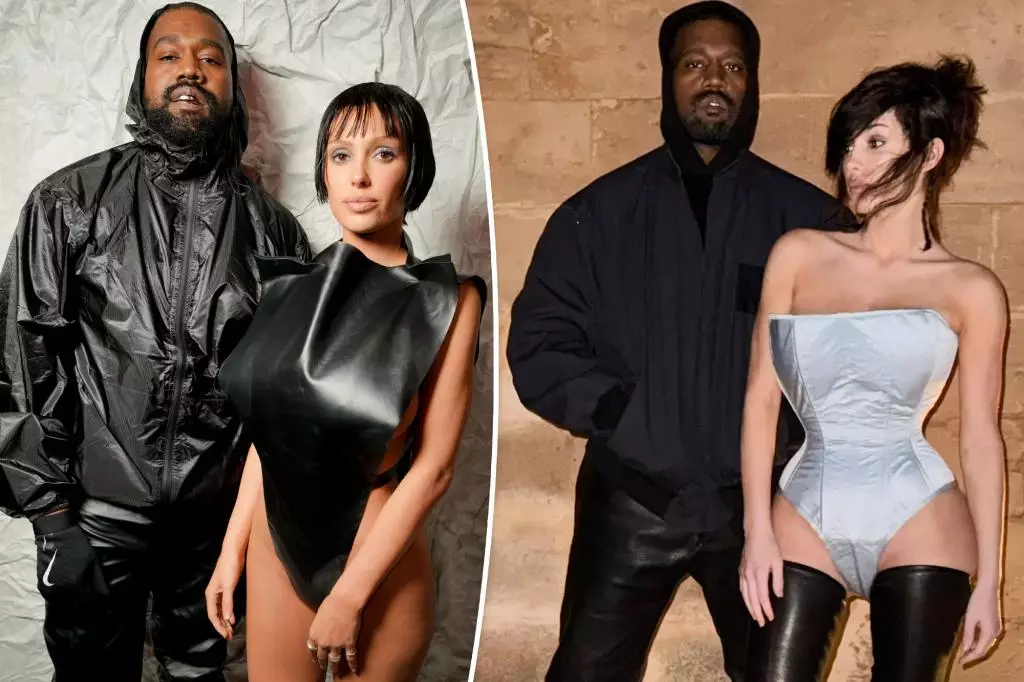In a world where the dynamics of relationships are continuously evolving, it is both alarming and intriguing to observe a high-profile figure like Kanye West reinstating archaic notions of dominance within marriage. Recently, he reiterated his role as his wife Bianca Censori’s “master,” following their tumultuous yet fascinating ongoing relationship. This statement has sparked a heated debate around the intersection of power, autonomy, and societal expectations in romantic partnerships, particularly for women.
West’s endorsement of a fan’s tweet that glorified subservience raises serious questions about how power is manifested in personal relationships. The tweet, which called for “every man” to have a supportive partner akin to Censori, compels us to scrutinize whether such views perpetuate harmful stereotypes. In an era where feminism and women’s rights have made significant strides, it is disturbing that celebrity discourse is still leaning toward antiquated patriarchal ideals.
The Sheer Symbolism of Control
What adds further fuel to this dialogue is Censori’s choice of clothing, particularly her sheer aesthetics at public events such as the Grammy Awards. Within fashion, particularly in celebrity culture, clothing can take on significant meaning, serving as both personal expression and social commentary. West’s claimed “dominion” over Censori’s public persona raises an essential discussion: Are these fashion choices truly a matter of personal freedom, or do they underscore a power dynamic that aligns with West’s narrative of dominance?
West’s earlier outburst on social media highlights a conflicting mentality; while he asserts that Censori’s decisions are independent, he simultaneously positions himself as the gatekeeper of her choices. This contradictory stance muddles the line between self-expression and control, planting seeds of doubt regarding Censori’s autonomy in the relationship.
The accompanying reactions from West’s spokesperson further complicate the situation. While asserting that Censori controls her fashion choices, the admission that West serves as the “final boss” in their union brings us back to the original conundrum of power. Is this a playful metaphor, or does it imply a more sinister hierarchy?
From Turmoil to Reconciliation
Navigating the rocky waters of their relationship has not come without its challenges. The couple has seen ups and downs, including public confrontations where West has unflinchingly addressed both media narratives and personal struggles through his music. Interestingly, while West professed his love and dependence on Censori, he admitted that her emotional turmoil stemmed from his controversial remarks on social media.
The troubling conditions surrounding their relationship reveal an unsettling cycle of conflict and reconciliation. The public is left to ponder whether these cycles of turmoil drive their affection or if they are merely a manifestation of unhealthy dynamics. While their reunions may seem romantic on the surface, analyzing the context reveals that such reconciliations could arise from a complex blend of love, loyalty, and the need to maintain a certain public image.
Voices in the Crowd: The Cultural Implications
What is equally noteworthy is the public narrative surrounding their relationship, often colored by powerful stereotypes that feed into societal beliefs about masculinity and femininity. The uproar from feminist circles, as well as traditionalists, illustrates how this relationship questions broader ideals of autonomy and partnership in contemporary love affairs.
The line between admiration and domination becomes increasingly blurred when analyzing public sentiment towards figures like West and Censori. Are we merely spectators, feeding into a narrative that resonates with antiquated beliefs about gender roles? The reactions compel us to question our own complicity in endorsing these dynamics by consuming and engaging with their public personas.
Ultimately, Kanye West and Bianca Censori’s relationship serves as a lens through which we can address pressing issues tied to power, gender roles, and personal agency in modern partnerships. The outrageous claims of master-servant dynamics challenge us to consider the implications of love and power, both in celebrity culture and our own lives. In dissecting these complexities, we find ourselves wrestling not just with West’s assertions, but with the values we uphold in our relationships with each other.

